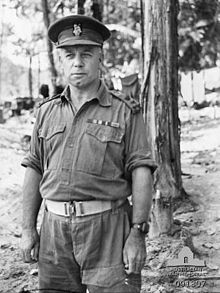John Field (brigadier)
| John Field | |
|---|---|

Brigadier John Field on Bougainville, April 1945
|
|
| Born |
10 April 1899 Castlemaine, Victoria |
| Died | 12 May 1974 (aged 75) St Kilda, Victoria |
| Allegiance |
|
| Service/branch | Australian Army |
| Years of service | 1923–1949 |
| Rank | Brigadier |
| Commands held |
Milne Force 7th Brigade 2/12th Battalion |
| Battles/wars | |
| Awards |
Commander of the Order of the British Empire Distinguished Service Order Efficiency Decoration Mentioned in Despatches (2) |
Brigadier John Field CBE, DSO, ED (10 April 1899 – 12 May 1974) was a senior officer in the Australian Army during World War II. He commanded the 2/12th Battalion in the Middle East and Milne Force and the 7th Brigade in New Guinea. He later went on to work with the State Electricity Commission of Victoria in large projects at Yallourn and the La Trobe Valley.
Born on 10 April 1899 at Castlemaine, Victoria, the only son of John Woodhouse Barnett Field and his wife Emily, née Bennett. His father was a colonel in the Citizens Military Force, and in 1910 he became a boy bugler of his father's regiment, the 8th Australian Infantry Regiment. He attended Castlemaine High School and went on to further studies at the Castlemaine Technical School. He was an apprentice to the engineering firm Thompson & Co. Pty Ltd when he was 15 years old, and he went on to become the senior designing draughtsman. He specialised in centrifugal pumps and pumping-plants.
On 11 October 1922, he married Kate Corlett at Castlemaine. On 1 April 1923, he was commissioned in the 7th Battalion, Citizens Military Force as a lieutenant. He was later promoted to captain on 10 July 1925. He was successful in an appointment to the faculty of engineering at the University of Tasmania in 1926. He lectured in engineering, drawing and design and also studied part-time for his Bachelor of Education. He still continued in the Citizen Military Forces with the 40th Battalion, and was assigned from time to time with the 6th Military District or the 6th District Base. In 1932 he won the army's gold-medal essay competition with his paper, 'The New Warfare', in which he wrote about the influence of modern technology on tactics. He was promoted to major on 30 November 1936.
...
Wikipedia
